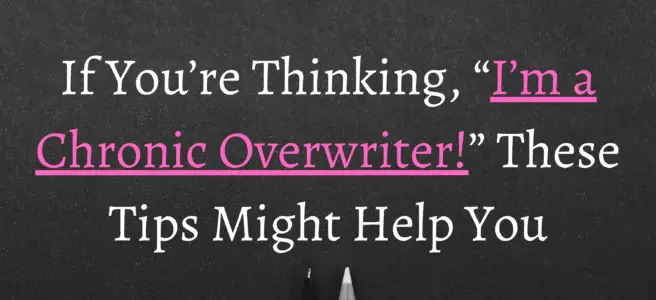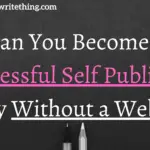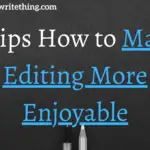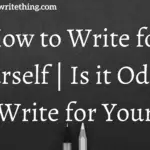
If You’re Thinking, “I’m a Chronic Overwriter!” These Tips Might Help You
We think most people struggle with not being able to write at all, but there is another struggle that plagues writers that isn’t discussed much: overwriting.
Tell me if this sounds like you:
“I’m like 90,000 words in and I haven’t even made it through the first act yet.”
“Not only am I an overwriter, but I’m an over-planner too!”
“My prologue is like 14 pages, is that too much?”
“I’ve been writing the same story for about 7 years. I keep going over it and changing it and moving stuff around, but when do I stop and call it finished?!”
If you ever found yourself thinking any of these thoughts, you are not alone and hopefully, these tips will help you.
Research is good but if you get daunted by it, it might be time to do something else.
Some overwriters get bogged down by the vast amount of research they feel like they need to put into their story to make it “well-grounded.”
While it’s true that good research does give a novel a good grounding, you’re not writing a history book.
Think about a Dan Brown novel, like the Da Vinci Code. In it, our main character, Langdon is an actual history genius.
And he uses this genius to solve riddles and clues to save the day.
Is his creator, Dan Brown a history genius? No. So how does he convince us that Langdon knows so much?
It’s all about timing and appearance.
All we have to do is display the right facts at the right moment.
For instance, we don’t have to know every detail about WWII in order to impress a reader. We just have to display the right knowledge at the right time.
Our character is suddenly in a bind. He needs to open a locked box, but it has a four-digit number lock on it. The box was owned by Hitler. It was hidden from the world but our main character and her counterpart hunted it down.
Counterpart: “Hmmmm a four-digit number, try Hitler’s birthday.”
MC: “1889, okay. Ugh no good”
Counter: “What about his wife’s birthday?”
Mc: “Good idea. Eva Braun, 1912! Man! Didn’t work either! What did this guy actually care about? What did he think that no one would know?!” Just then she got that look in her eyes. She scrambled to race her fingers across the number lock as fast as she could.
It clicked open.
They both stared at each other in amazement.
Counter: “What was it?”
Mc: “His mother, Alois Hitler, 1860.”
Now, I’m no history buff and I sure don’t know anything about Hitler and the dates that surround his birthday and his family’s birthdays. But if you were reading that in a story you would assume that our MC has studied a lot about the life of Hitler to be able to on the spot recall the birth years of Hitler, his wife, and his mother.
It didn’t take me hours of research, it just took a few moments and a clever method to convince the reader that my MC is a smart person and maybe proficient in the study of Nazi Germany.
If I want to convince my reader that she knows more about WWII I’ll have to find other clever ways to show what she knows.
And that is just the point. You have to show what the characters know, not what you know. And of course, for certain settings there has to be well-done research, but not to the point of confusing yourself.
Look up what you need to and use it strategically. No need to write about every detail of the historical setting.
Interested in starting a blog of your own? Check out Bluehost.
Get the story down first.
There’s a great Neil Gaimen quote for this.
He once said, “Write down everything that happens in the story, and then in your second draft make it look like you knew what you were doing all along.”
This is a major part of what bogs down overwriters.
Sometimes we just don’t write out what happens in the story first. We try to make sure every little detail and note we think of makes it in before we can say, “done!”
Instead, think of it like the human body. The bones are the structure of the story. What holds it up. You just need to write out the action that happens and what the story is as a whole in what makes it move forward from start, middle, and end.
Then you can go back in and give it meat, fat, and skin.
Give it the details it then needs to be convincing, but not overwhelming.
If it’s overwhelming for you to write ALL the details you want, it might just be overwhelming to read. And we don’t want it to be overwhelming to read.
Get the bones down first. Go all the way through everything that happens all the way through the end. Then and only then, go back and edit and add in some good strategic details that bring the bones to life. Cut out the unnecessary fat. (This is sounding more like a weight-loss plan than writing tips.)
Just write what is purposeful to the plot first.
A major problem with overwriting is just writing any and every little detail that comes to mind or COULD be added in at some point.
If it works for your writing process you can by all means write down a bunch of backstory and details that are interesting notes to your overall idea.
But this cannot be the story.
Your story is anything that is purposeful to the plot and the enjoyment the reader gets from reading what you’re writing.
This could include meaningful:
- dialogue
- character development
- interesting facts
This should exclude your NOTES on researching creative ideas for the story. Your notes about everything and different ideas that come to you randomly should be written down, but in a completely different space than where you are writing down the actual entertaining story you are trying to tell.
Interested in starting a blog of your own? Check out Bluehost.
Some of the greatest stories ever told can be summarized in three sentences.
I recommend you try this exercise.
Try to summarize your story in one sentence. Then Two, then three, and then make it into a larger paragraph.
Once you’ve done this you have simplified your story.
Do this with your beginning, middle, and end of your story. Now you’ve simplified it into three structured parts. Now you can see it from the big picture.
As an overwriter, sometimes we get so focused on all the tiny details that we have all this material and it gets so confusing. It’s like the room is filling up with words and we can’t breathe.
Don’t get so lost in the details. Take a step back and view the entire story simply. Then it will be easier to see where you need to start and end.
The small details won’t be so overwhelming anymore. They will just be extra material for you to work with.
It’s usually a problem with outlining.
One simple technique that will change an overwriter’s life is outlining.
If we outline the entire story and then go back and fill it in it’ll be much harder to get lost in overwriting.
James Patterson is the king of outlining. 👑
He pumps out tons of books each year mostly through his great ability to outline well. He has ghostwriters. For many of his stories today, he creates an outline that’s good and then hands it off to one of his writers to fill in. This is how he’s not just an author today, but a story factory.
He pumps out so much fiction in a given year that you’d think he’s actually a robot 🤖.
But he’s not. No, the truth is his secret weapon is outlining.
The beauty of an outline is that it by definition is the bare bones of a story. An overwriter has no choice but to skim it down or else it’s not an outline, it’s just more notes.
Start practicing outlining the next part of your story and you might see quickly how this will organize the smaller important details of your story instead of getting lost in a sea of notes.
Interested in starting a blog of your own? Check out Bluehost.
Final thoughts
As overwriters, we get lost in the tiny details.
We need to step back and see the overarching story, beginning, middle, and end.
Use writing exercises discussed here to try to simplify the beginning, middle, and end of your story in your mind.
Outlining will be your new secret weapon to getting the entire story out so we can see what details need to be added in to make it a well-grounded, interesting read.
Hope that helps!
Happy writing!
Another Post you Might like:
Mythical Creatures | 7 Tips on How to Write Mythical Creatures
Other Popular Posts you might enjoy:
5 Tricks How to Hide Your Villain Right Before Their Eyes
10 Tips How to Write Villains that Play Mind Games with Their Victims
4 Tips How to Write your Character Hitting Rock Bottom
10 Toxic Bad Habits That’ll Crush Your Fictional Character’s Relationships
How to Write From Your Villain’s Mind.
How To Write 4 Scenes That Reveal Who Your Character Is Seamlessly
Psychopath: How to Write The Perfect Psychopath
8 Tips How to Write the Perfect Sociopath
Fictional Characters: 28+ Bad Habits to Introduce to Your Fictional Characters
List of 10 Weapons for Fictional Characters
List of 10 Bad Habits Fictional Characters Need Help Breaking
Resources:
How to Start a Blog in 11 Simple Easy Steps in 2020
How to Write a Book: 32 Tips | Your MASSIVE Guide How to Write a Book
Define Self-Esteem for Writing Characters: 10 Ideas
Covert Narcissist and Why You Should Write One
Inspiring Quotes Posts:
Inspiring Quotes | 101+ Inspirational Quotes to Motivate You Today
190+ Inspirational Quotes for Women
303+ Funny Inspirational Quotes
115+ Inspirational Quotes in Short
103+ Quotes About What is Love
This post:
If You’re Thinking, “I’m a Chronic Overwriter!” These Tips Might Help You
Interested in starting a blog of your own? Check out Bluehost.
After checking out Bluehost, see how we made a profit FAST with our blog and how you can too: Our #1 Easy way that we made a profit with our blog on year 1, not year 5.
Need a Cheaper Plan? Try DreamHost.
If You’re Thinking, “I’m a Chronic Overwriter!” These Tips Might Help You
Enjoying If You’re Thinking, “I’m a Chronic Overwriter!” These Tips Might Help You? Take a moment and consider sharing this social-friendly image to say thanks and feel free to comment with your thoughts below! 🙂

Make sure your posts are readable. Use this readability score check
Want to check out a writer’s community to test your writing and get feedback?
If You’re Thinking, “I’m a Chronic Overwriter!” These Tips Might Help You
Enjoying If You’re Thinking, “I’m a Chronic Overwriter!” These Tips Might Help You? Take a moment and consider sharing this social-friendly image to say thanks and feel free to comment with your thoughts below! 🙂
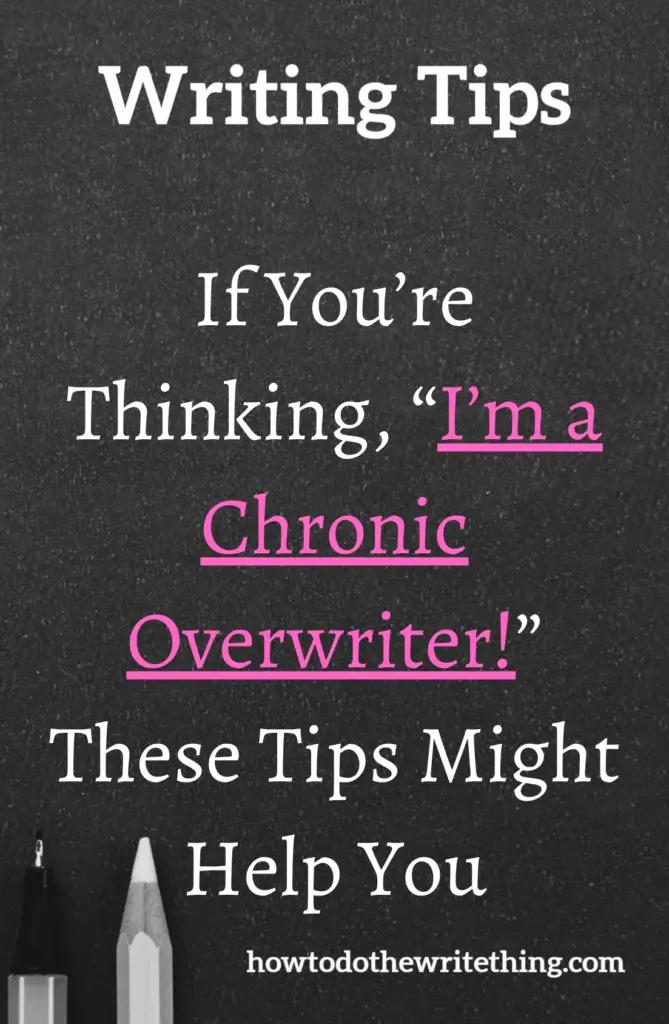
Interested in starting a blog of your own? Check out Bluehost.
After checking out Bluehost, see how we made a profit FAST with our blog and how you can too: Our #1 Easy way that we made a profit with our blog on year 1, not year 5.
Need a Cheaper Plan? Try DreamHost.
Check out these FREE trial resources from Amazon for when you work from home (or are stuck at home 🙂 ) As an Amazon associate, if you do sign up or buy anything using Amazon links from our site we make a commission at no extra cost to you.
Free Prime Membership Trial:
Try Amazon Prime 30-Day Free Trial
Try Prime Discounted (Free Trial)
Make your Free Amazon Wedding Registry:
Create an Amazon Wedding Registry
We hope you enjoyed: If You’re Thinking, “I’m a Chronic Overwriter!” These Tips Might Help You!
